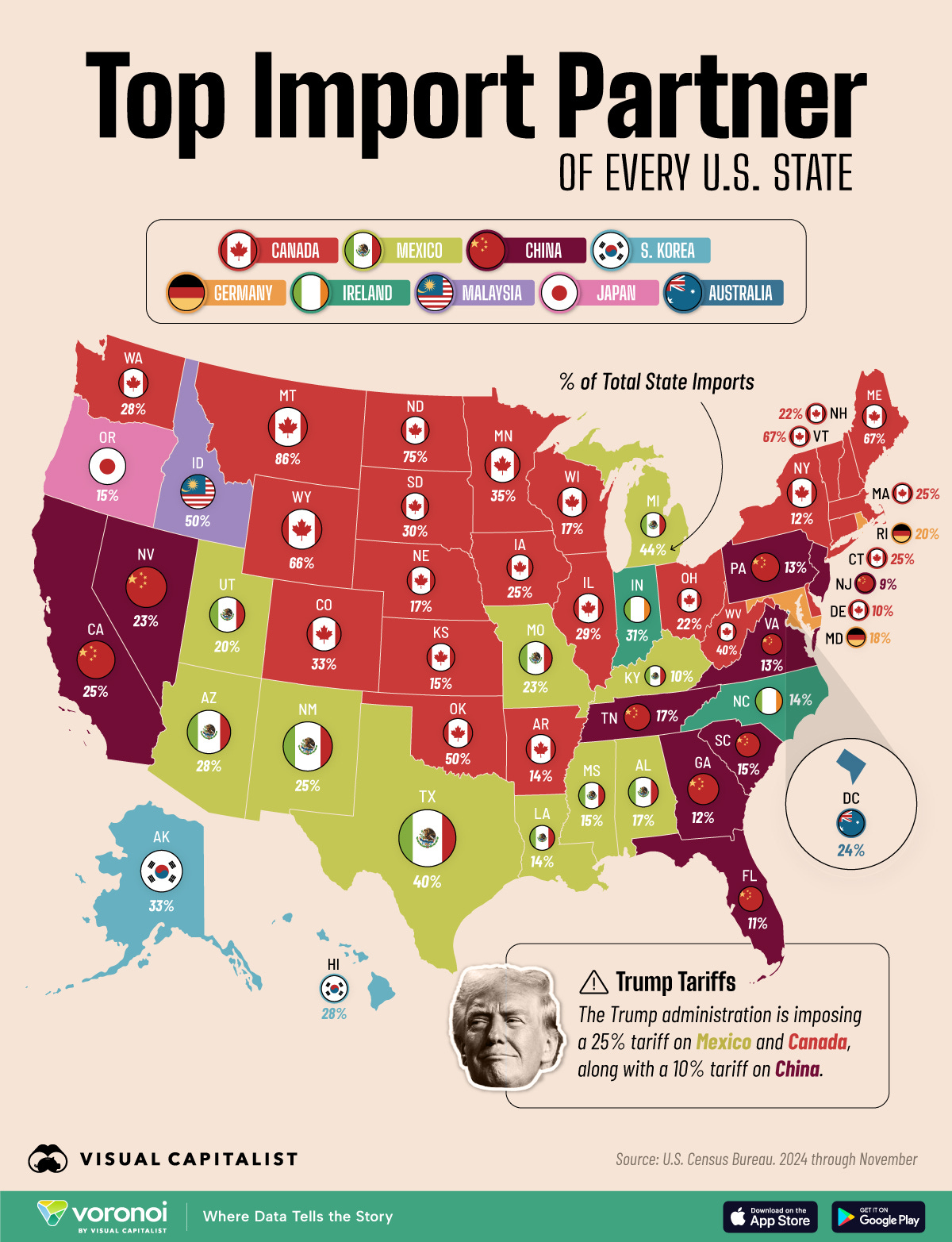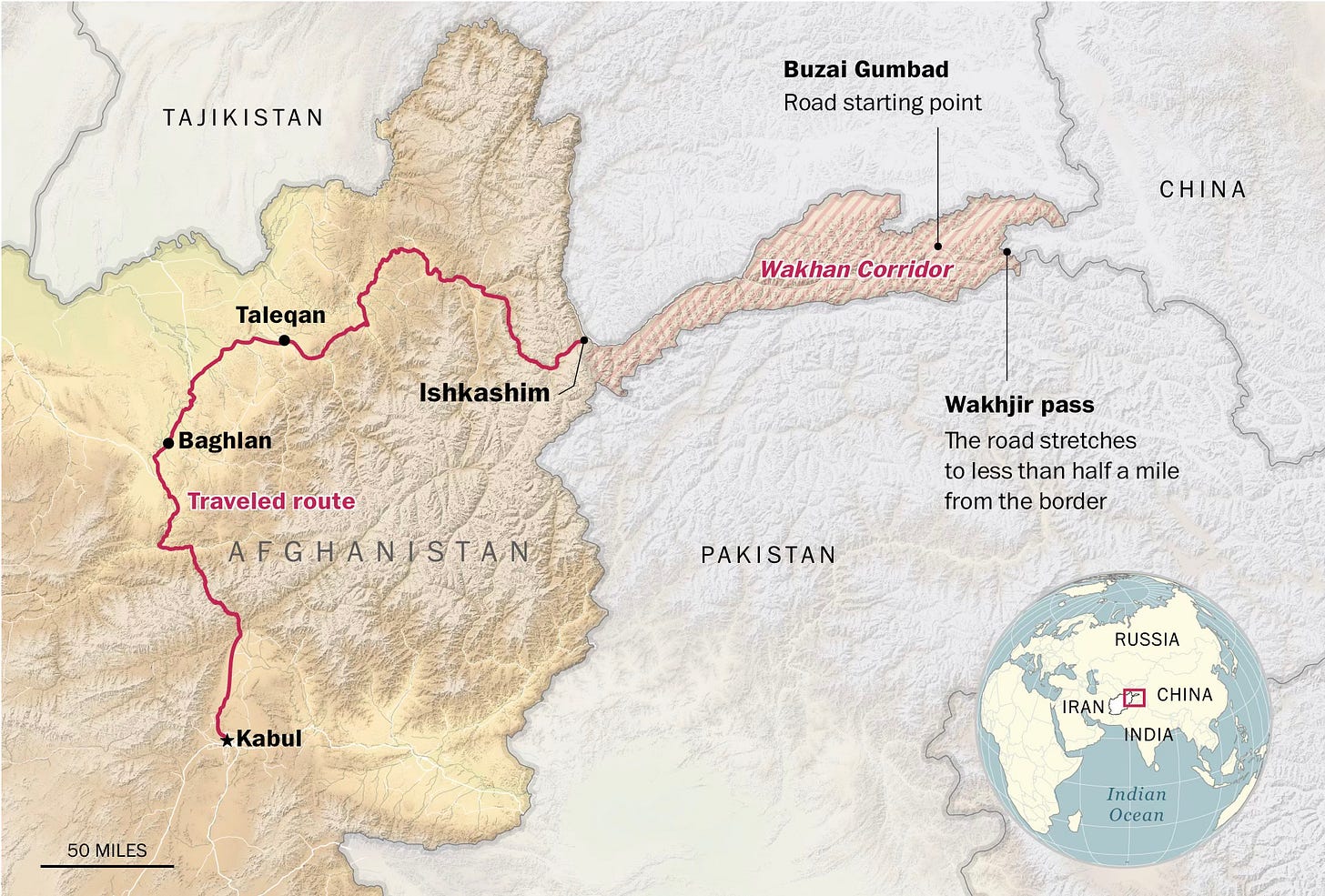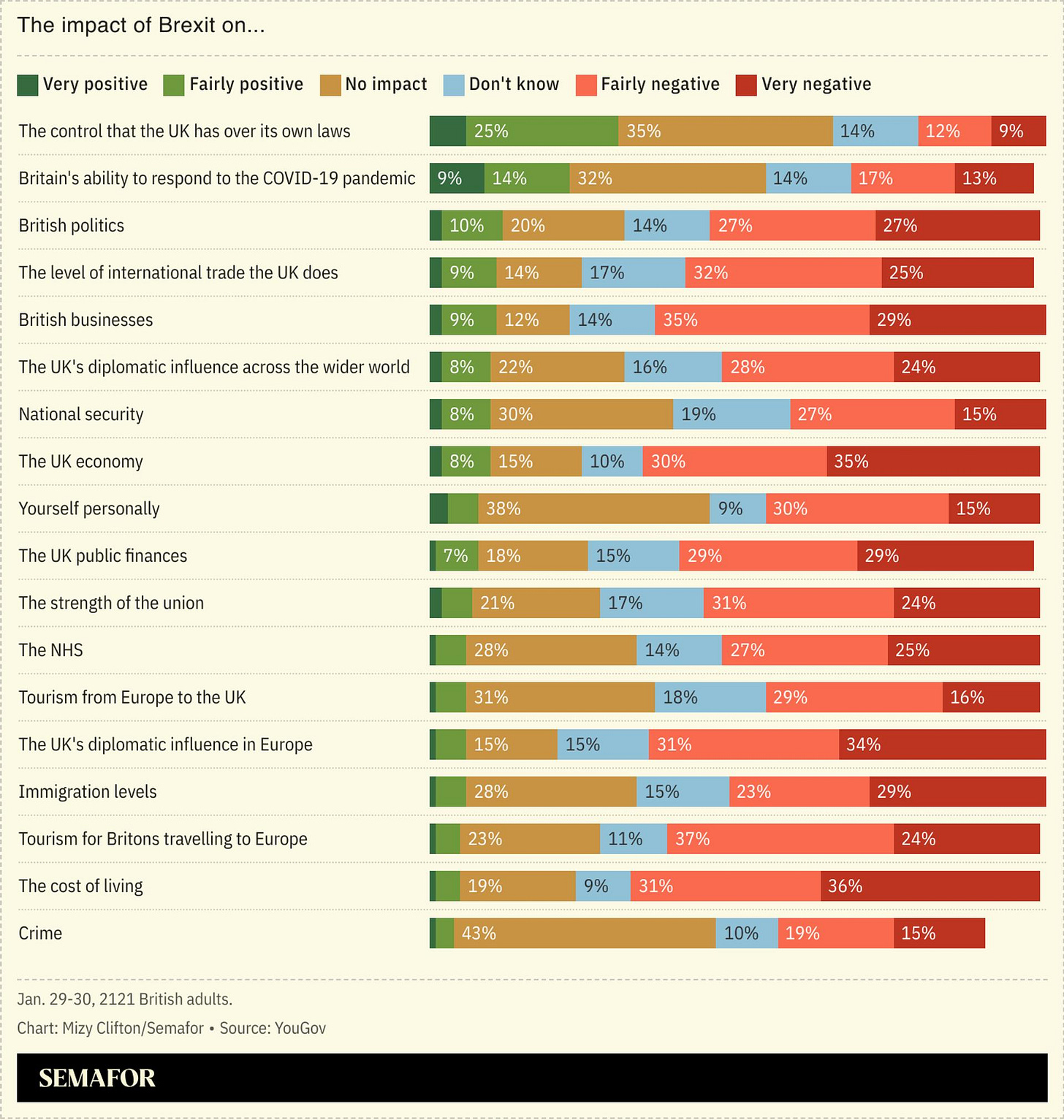1) Your Friends & Neighbors
VISUAL CAPITALIST: The Top Import Partner of Every U.S. State
Pretty distinct, huh? Canada to the north, Mexico to the South, and Asia (mostly China) on the coasts.
If you’re Trump and you want to disrupt state-based economies, then targeting those three is the way to go.
And if you’re just bluffing and are easily bought off with some symbolic troop movements, then you avoid angering your base (fly-over country), whereas continuing to stick it to China only hurts the liberal coasties you want to punish anyway.
Kind of clever in a truly devious way.
2) Climate change? Down the memory hole!
FOX NEWS: Federal agencies scrub climate change from websites amid Trump rebranding
NYT: The Climate Fix: Africa’s Solar Revolution
President Trump, now the true Floridian, follows the example of Gov. DeSantis and scrubs all mentions of climate change in official documents — deeply Orwellian in its absurdity and ambition.
It seems to be going around, per the NYT reporting on this landmark international agreement to go all-in on solar in Africa:
This week, top officials from dozens of African countries convened with major international lenders to commit to the biggest rollout of renewable energy in the continent’s history.
The $35 billion in loans from The World Bank, African Development Bank and other financial institutions, at below-market interest rates, are aimed at getting electricity to half of the 600 million Africans without it. About half the money will go toward village-level solar grids.
It wasn’t just a hopeful moment for people who’ve been deprived of the most foundational facet of modern life. It’s a moment that could have enormous climate implications.
And yet, the words “climate change” were barely uttered at the two-day summit in Dar es Salaam, Tanzania.
Why?
With the blame for climate change lying undeniably at the feet of Africa’s former colonizers, and with the United States, which has just elected a leader who has called climate change a hoax, Africa’s leaders are done crowing about the issue. They know the developed world is not acting fast enough to enact durable solutions to the climate crisis.
Why does this matter?
Most future greenhouse gas emissions will come from China, India and Africa. Their mix of energy sources will decide the climate’s future as much as the Europe and the United States’ historical emissions have led us to our precarious present.
As I like to note here: Africa presents the mother-of-all-demographic-dividends circa mid-century, when one out of four humans will be African and the majority of Africans will be under the age of 18 — still.
Africa is yearning to grow. Over the next decade, hundreds of millions of Africans will need jobs that don’t currently exist. In many countries, societal collapse is not just a worry, it is an ongoing disaster that scores of people will do anything to escape from. Expanding electricity access is one of the surest ways to start strengthening Africa’s long hobbled and exploited economies.
What Africa wants, then, is investment and development.
Who saw that coming?
China saw that coming, not just in Africa but around the developing world.
From my second Massive Open Online Course (MOOC) currently available on edX and Coursera (with already more than one-thousand total enrollees on the former):
With any luck, Trump will make the US a complete afterthought in this superpower race to power-up the Global South.
That’ll teach those climate-change hoaxers!
3) And the children shall lead
THE STAR: I get why four in 10 young Canadians want to join the U.S.
When asked:
More than four in 10 (43 per cent) Canadians between the ages of 18 and 34 said they’d vote to join the States if Canadians were offered full American citizenship and had their Canadian assets converted into U.S. dollars.
Less than one-fifth of older Canadians will consider this pathway, and yet:
Almost a third of young Canadians think “it’s only a matter of time” before Canada and the U.S. merge into one country.
Older Canadians aren’t going to be around to deal with apogee of climate change later this century, whereas young Canadians will.
Canada is 0.5 percent of the world’s population living on almost 7 percent of the world’s non-Antarctic landmass.
That is an unrealistic pathway in a century featuring mass South-to-North migration as climate change devastates the Western Hemisphere’s lower latitudes (the vast majority of Latin America).
4) The only way you connect Afghanistan to the global economy is through its immediate neighbors
WAPO: A Taliban highway could lead to the future. But it’s stuck in the past.
This was the essential lesson that America refused to learn in both Afghanistan and Iraq: the whole purpose of toppling the regime and engaging in nation-building was to leave the country more connected to the outside world than we found it, and that means putting those nations’ immediate neighbors at the forefront of that connecting-up process.
Instead of following that logic, America, located on the other side of the planet, decided that we and we alone were going to be in charge of these nation-building schemes — shutting out neighbors we didn’t want gaining any undue influence (lest America win the war only to let COUNTRY X win the peace).
That, in a nutshell, is how we screwed the post-war peace in both nations — a completely unrealistic approach. The vast majority of Afghanistan’s trade is with immediate or one-over neighbors.
Years later now:
More than three years after the Taliban seized power, Afghanistan remains economically decrepit and politically isolated. But now, the Taliban government has a plan to turn one of the country’s remotest corners into a global trade hub.
The regime wants to build a highway through the Wakhan Corridor, the narrow, rugged panhandle in the far northeast, to connect the Afghan heartland with China — and place itself at the center of international commerce.
A pipe dream? Probably.
Chinese companies have struck numerous deals to mine rare minerals in Afghanistan since the Taliban takeover. But despite the Taliban’s claims that China is eager to team up with the regime to facilitate trade via the Wakhan Corridor, Beijing has so far stayed away from undertaking large infrastructure projects.
Why? The local ISIS branch has developed a taste for targeting Chinese workers and — by extension — “China’s daydream of imperialism.” Meanwhile, the Taliban fret that Pakistan may invade the corridor to prevent what meager construction it has achieved to-date.
But the even more harsh reality remains: so long as Afghanistan is mostly informally and narrowly connected to the global economy, it will stay an economic basket case good only for importing and exporting extremism.
5) A list of AI no-no’s
TECH CRUNCH: AI systems with 'unacceptable risk' are now banned in the EU
Per the EU, thou shall not use AI in the following ways:
AI used for social scoring (e.g., building risk profiles based on a person’s behavior).
AI that manipulates a person’s decisions subliminally or deceptively.
AI that exploits vulnerabilities like age, disability, or socioeconomic status.
AI that attempts to predict people committing crimes based on their appearance.
AI that uses biometrics to infer a person’s characteristics, like their sexual orientation.
AI that collects “real time” biometric data in public places for the purposes of law enforcement.
AI that tries to infer people’s emotions at work or school.
AI that creates — or expands — facial recognition databases by scraping images online or from security cameras.
Sure, there are regulatory carve-outs for law enforcement and medical therapeutics and such, but you get the idea: the EU, as usual, is leading the way on regulating in the name of protecting the public from technologies that race too fast and too far ahead of social and political norms.
The EU does the world a service, in this regard.
6) Brexit regret ever strong in UK
SEMAFOR: Brexit is more unpopular than ever five years on
Britain’s exit from the EU is one of the all-time “own goals” in geopolitics — a truly self-inflicted wound.
Believe it or not: what that event “proved” back then about Trumpism, MAGAism, and right-wing sovereignty-fixated nationalism NOW gives way to a sense of deep popular regret that actually dovetails with Trump 2.0’s new fixation on regional integration (Give us your poor Canadians, your tired Greenlanders, and your huddled Panamanians yearning to be free!).
Point being, in a world being progressively integrated by a handful of superpowers, a going-it-alone strategy is … kind of backward — as in, NOT the future.
So, no surprise, the canary in the coal mine of economic nationalism is now chirping a different tune:
Five years after the UK left the European Union, Brexit is more unpopular than ever.
Only 11% of Brits think Brexit has been a success, and a slim majority (55%) now support rejoining the bloc, according to YouGov polling released Friday — a higher percentage than those who voted Leave in 2016.
The numbers are just brutal across the board:
Americans caught up in this notion that we’d be better off reducing our trade with the world and producing everything at home should take note of this real-world experiment, because it has simply not worked.
7) America is “leading” the trend toward regional trade pacts
NYT: One Response to Trump’s Tariffs: Trade That Excludes the U.S.
The subtitle says it well:
A growing number of countries, including American allies, are striking trade deals as the Trump administration erects a higher fence around its global commerce.
This is the thing most people don’t understand: during the good economic times, countries don’t feel compelled to cut trade deals, and so they fall out of favor (Who needs them?). It’s when economic times sour that countries are much more willing — even desperate — to seek and forge such deals.
America is doing well right now relative to other advanced economies, and so we think — per Trump — that we don’t need no stinkin’ trade pacts, which is why we are swimming upstream and all alone right now in our desire to reduce our trade connectivity with the world.
But our example, such as it is now, is not really leading anybody to similar actions. Instead, our fit of pique is having the opposite effect.
We’ve become the George Constanza of the global economy (the Seinfeld show episode called “The Opposite”:
George remarks to Jerry in Monk's Café that every decision he has ever made has been wrong, and that his life is the exact opposite of what it should be. Jerry convinces him that "if every instinct you have is wrong, then the opposite would have to be right". George experiments with doing the complete opposite of what he would do normally. He orders the opposite of his normal lunch, and introduces himself to a beautiful woman who happens to order the same lunch, saying, "My name is George. I'm unemployed and I live with my parents." She is impressed and agrees to date him … Thanks to his date, George gets an interview at the New York Yankees' headquarters, where he also does the opposite of his instincts and criticizes George Steinbrenner about his management practices, thus landing him the job of Assistant to the Traveling Secretary. He moves out of his parents' house. Enraptured with his success, he comes to regard the Opposite as his personal philosophy.
Anybody who wants to be really happy and progress can just ask themselves, What would Trumpist America do? And then do the complete opposite.
We thus lead by negative example, which sums up Trump 2.0 pretty well.
Don’t try this at home!
8) Full steam ahead on Naval Singularity
AXIOS: 1 big thing: "Embrace the robots"
Axios defense guru reports that the move to unmanned ships is all the rage at the major naval industry conferences.
Citing Ukraine first and foremost:
The future — mechanical, intelligent, overwhelming — is today smacking us in the face.
Yes, the Centaur Solution still applies, per the USN surface boss:
Manned-unmanned teaming is the future.
And yet, the growth of the latter ensures the reductions of the former, as soldiers and sailors and marines all get pushed to safer margins while the machines fight it out among themselves.
Is this the end of “end strength” as anybody’s long pole in the tent?
Military end strength is the number of personnel in a branch of the military on the last day of a fiscal year. It's determined by each military service through recruiting and retention efforts.
It would sure seem to be, which makes all the de-woke-ification stuff seem already anachronistic. It doesn’t take a certain type of genitalia to operate drones, last time I checked.
The warrior spirit is similarly doomed: Don’t need the spirit if you don’t need the warrior. Instead, we are heading into a future dominated by pure operators.
Ender’s Game.
9) Promises made, promises abandoned
GUARDIAN: Deaths predicted amid the chaos of Elon Musk’s shutdown of USAid
Count on it: the scandals, the exposes, the finger-pointing, and, yeah, the body count.
History will look back at this as the great collapse of US foreign aid and — by extension — US foreign policy.
I don’t think Rubio had any idea how tough his time is going to be.
Musk’s personal attacks on USAID personnel are absolutely bizarre.
The better media pitch is the Billionaire versus Starving Kids Everywhere.
This is a policy intervention doomed to cause major collateral damage among civilian populations.
10) Central Asia meets the new boss. Same as the old boss.
EURASIANET: China enhances position as Central Asia’s economic overlord; Trade balance heavily favors Beijing.
SCMP: Belt and robot: Chinese start-up to open first robotics facility in Central Asia
China in full-on frontier-integration mode across Central Asia, with Russia taking the loss and India feeling further encircled.
You can talk about the BRICS all you want as some super-band, but China runs the show.
Top Trump Administration officials have set countering China’s growing global influence as a top foreign policy priority. In Central Asia, US officials will face an uphill struggle in trying to reduce Beijing’s expanding economic footprint.
Beijing has reinforced its position as the dominant economic player in the region, which sits on China’s western border, recording an almost 5 percent growth in trade turnover in 2024, according the data published by the country’s General Administration of Customs. China has muscled Russia aside as the region’s top trade partner.
I don’t see the Trump administration spending any time or effort to counter Chinese influence across Central Asia — those robots have already left the barn.
It’s not personnel, it’s strictly robotics.
Humanoid robots are rapidly emerging as one of China’s most high-profile growth industries alongside electric vehicles and AI, with a phalanx of dancing robots from another start-up, Unitree Robotics, attracting huge attention during last week’s Spring Festival Gala – an annual Chinese TV extravaganza watched by over 1 billion viewers.
I say, dance with the robot that done brought ya!
11) Boiling the ocean every day? Stipulated!
WEAVENEWS: We Have Entered the Era of ‘Global Boiling’ - Marine Wildlife, Ecosystems, and Economies Are Being Devastated
The Holy Grail of so many tech startups: the “ability to boil the ocean every day,” sucking in vast amounts of Big Data and making sense of it all.
Turns out humans are capable of the real deal.
The severe judgment:
The ocean absorbs 90 percent of the excess heat generated by burning fossil fuels and deforestation. Climate change caused by greenhouse gas emissions is the primary driver of long-term global warming. Today, humanity is officially in uncharted waters. According to the Copernicus Climate Change Service, in February 2024, the average global sea surface temperature (SST) reached 21.06 degrees Celsius, the highest level ever recorded by the service …
The extraordinarily high sea surface temperatures recorded in 2023 provide a frightening glimpse into the planet’s future. A study by researchers at the University of Reading and Imperial College London, published in March 2024 in the Bulletin of the American Meteorological Society, found that temperatures in the top 100 meters of ocean basins around the world have steadily increased since 1980 …
They concluded that extreme sea surface temperatures in the North Atlantic during 2023 “lie at the fringe of the expected mean climate change for a global surface-air temperature warming level (GWL)” of 1.5 degrees Celsius and closer to the average of 3.0 degrees Celsius GWL. If this scenario is attained globally, it would have catastrophic consequences, including the eventual collapse of ice caps. This would lead to an uncontrollable rising sea level that would consume low-lying cities and contaminate water sources with seawater worldwide.
Marine heat waves are also a factor in extreme weather events, as the energy of warm surface water leads to hurricane formation.
The continuing drumbeat from the scientific community: we are very possibly-bleeding-into-probably underestimating how fast and how bad this can get.
Current USG efforts to erase all mention of climate change in official documents will someday be looked upon like some goofy, Monty Python-like farce from the Middle Ages.
How do you know she’s a wicked weather scientist?
So many witches to burn, so little time.
12) The West is the most well-off
VISUAL CAPITALIST: All of the World’s Countries, by Income Group
What impresses me here?
First, only 12% of the world’s countries register as low-income.
The Western Hemisphere’s overall lack of severe poverty — basically no low-income.
In comparison, Asia’s got a ways to go and the center-slice of Europe/Middle East/Africa is pretty well divided between haves and have-nots — for now.
So I say that the true West is well positioned for this century’s many stressors, while Europe better hope that South Asia pulls it off so Asia as a whole can do what needs to be done to pull up Africa and its billion-plus demographic dividend as it unfolds. Otherwise, we’re looking at some serious Camp of the Saints dynamics.






















